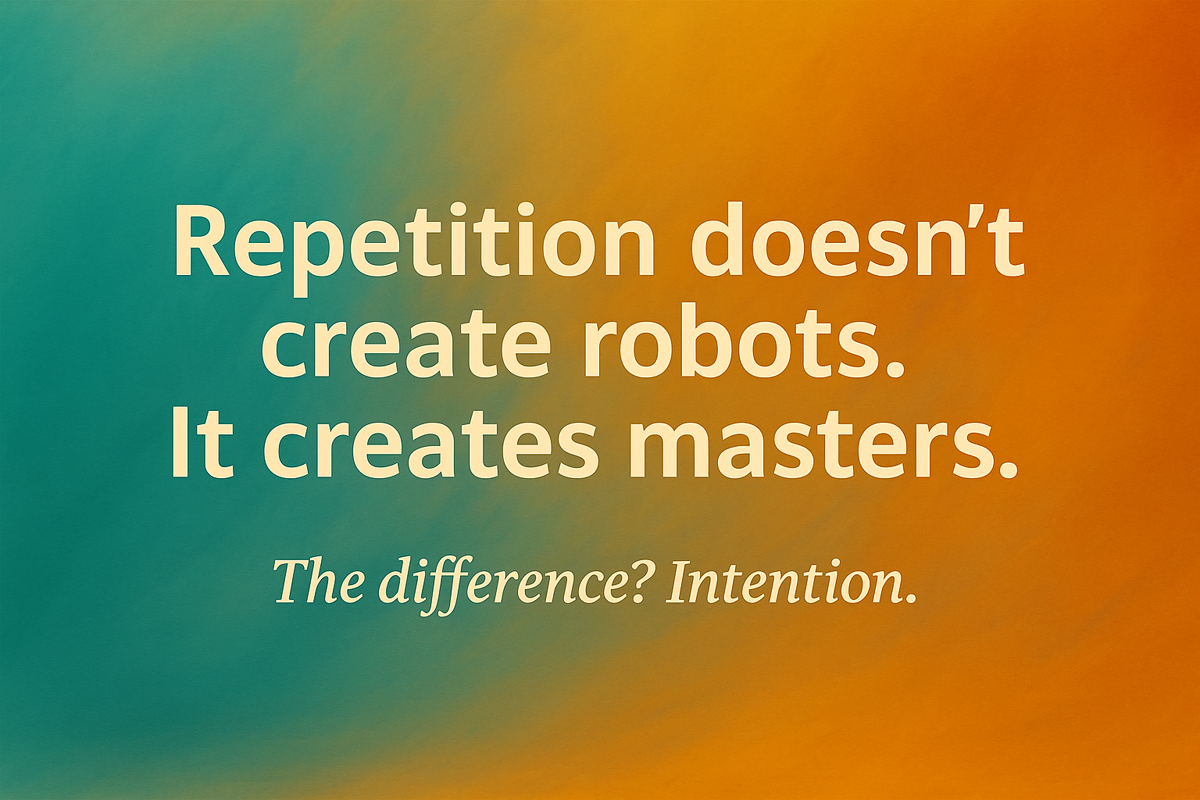· Ivelin Kozarev · Sales Training · 4 min read
Why Sales Roleplay Doesn't Make Reps Sound Robotic (And What Actually Does)
The real problem isn't repetition—it's mindless repetition. Learn how deliberate practice builds natural, confident sales reps while poor training creates robots.

“Aren’t we just making reps sound robotic?”
This question pops up every time we talk about roleplay training. I get it. The concern makes perfect sense on the surface.
But here’s what’s really happening: We’re confusing two completely different types of repetition. One creates robots. The other creates masters.
The real culprit behind robotic sales reps
Picture this scenario. A new sales rep gets handed a script on their first day. They’re told to memorize it, stick to it, and make 50 calls.
Day after day, they recite the same words in the same order. Nobody asks if it’s working. Nobody provides feedback. The rep never stops to think, “How did that prospect react when I said that?”
This is mindless repetition. And yes, it absolutely creates robotic-sounding reps.
The problem isn’t the repetition itself. It’s the lack of intention behind it.
What deliberate practice actually looks like
Real skill development happens through deliberate practice. This means:
- Repeating fundamentals with purpose - Not just saying words, but understanding why each phrase works
- Constant feedback loops - After each interaction, asking “What worked? What didn’t?”
- Small, intentional adjustments - Testing slight variations to see what resonates better
- Reflection and analysis - Understanding the psychology behind prospect responses
Think about how musicians practice. They don’t just play a song 100 times and call it done. They slow down difficult passages, work on specific techniques, get feedback from teachers, and gradually build complexity.
Sales should work the same way.
Why traditional “live training” falls short
For decades, sales reps learned through trial by fire. They practiced on real prospects during real calls that could make or break actual deals.
This approach had three major problems:
It was slow. Reps needed months to encounter enough different scenarios to build confidence.
It was risky. Every mistake happened in front of someone who could potentially buy from the company.
It was expensive. Lost deals, damaged relationships, and extended ramp times cost organizations serious money.
Even worse, reps often developed bad habits because they never got proper feedback on what went wrong.
The safe space solution
Modern sales training flips this model. Instead of learning on live prospects, reps can now practice in controlled environments where mistakes become learning opportunities.
Here’s what changes when reps can practice safely:
- They experiment with different approaches without fear
- They receive immediate, specific feedback on their performance
- They can repeat challenging scenarios until they master them
- They build genuine confidence before facing real prospects
This isn’t about creating scripted responses. It’s about building the foundational skills that allow for authentic, adaptive conversations.
What freedom through repetition really means
Athletes understand this principle intuitively. A basketball player practices thousands of free throws not to become a robot, but to make the motion so natural they can focus on the game situation.
A jazz musician practices scales relentlessly not to sound mechanical, but to have the technical foundation that allows for spontaneous creativity.
Sales works the same way. When reps have truly mastered the fundamentals through deliberate practice, they gain:
- Confidence to go off-script when the conversation demands it
- Ability to be genuinely conversational because they’re not worried about what to say next
- Mental space for creativity since the basics happen automatically
The practical difference
Let’s compare two scenarios:
Mindless repetition: A rep memorizes a cold calling script and delivers it identically 50 times, never adjusting based on prospect responses.
Deliberate practice: A rep practices the same cold call scenario 50 times, but each time they test different tonality, experiment with various value propositions, and analyze which approaches generate the most engagement.
The first creates a robot. The second creates a skilled professional.
Making the shift in your organization
If you want your sales team to sound natural and confident rather than scripted and mechanical, focus on the quality of their practice, not just the quantity.
Ask these questions:
- Are reps getting specific feedback on their performance?
- Do they understand why certain approaches work better than others?
- Can they practice difficult scenarios multiple times in a safe environment?
- Are they reflecting on what they learn from each interaction?
The goal isn’t to eliminate repetition from sales training. It’s to make that repetition purposeful and progressive.
Ready, not robotic
Here’s the bottom line: The best sales reps aren’t the ones who never practice. They’re the ones who practice with intention.
They’ve put in the work to master fundamentals in a controlled environment. They’ve experimented, failed, adjusted, and improved before ever picking up the phone with a real prospect.
When game time comes, they sound natural because they are natural. They’ve earned the freedom to be conversational, creative, and authentic through deliberate preparation.
That’s not robotic. That’s ready.
The question isn’t whether your reps should practice. It’s whether they’re practicing in a way that builds real skills or just hardens bad habits. Choose wisely.



